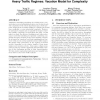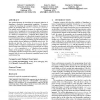2084 search results - page 404 / 417 » Proving Time Bounds for Randomized Distributed Algorithms |
121
Voted
MOBIHOC
2009
ACM
16 years 3 months ago
2009
ACM
Distributed scheduling algorithms for wireless ad hoc networks have received substantial attention over the last decade. The complexity levels of these algorithms span a wide spec...
146
click to vote
INFOCOM
2010
IEEE
15 years 29 days ago
2010
IEEE
—Efficient operation of wireless networks and switches requires using simple (and in some cases distributed) scheduling algorithms. In general, simple greedy algorithms (known a...
129
click to vote
SIGSOFT
2007
ACM
16 years 3 months ago
2007
ACM
The standard language for describing the asymptotic behavior of algorithms is theoretical computational complexity. We propose a method for describing the asymptotic behavior of p...
110
click to vote
VLDB
2001
ACM
15 years 7 months ago
2001
ACM
Similarity retrieval mechanisms should utilize generalized quadratic form distance functions as well as the Euclidean distance function since ellipsoid queries parameters may vary...
156
click to vote
ICPADS
1994
IEEE
15 years 6 months ago
1994
IEEE
Testingthe performance scalabilityof parallelprograms can be a time consuming task, involving many performance runs for different computer configurations, processor numbers, and p...


